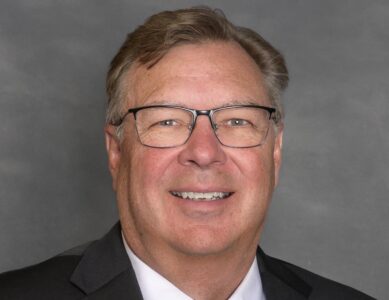One Lawrence man is using his experience as a double amputee to give hope to others in a limb loss support group

photo by: Bremen Keasey
Rex Ellebracht, center, in black, helps run a limb loss support group at LMH Health, where he also serves as a peer advocate for people who have their limbs removed.
Rex Ellebracht has been doing social work across Kansas for nearly 30 years by his own estimate, but it became even more personal for him after he lost a leg.
Ellebracht has diabetes, and around 10 or 12 years ago when he was facing complications from the disease, the doctors — after initially thinking they could potentially save his left leg — eventually decided it needed to be amputated. Ellebracht said it was a trying time, and hard to face initially during that time.
“You’ve had this a part of your life all your life and then it’s whacked off,” Ellebracht said. “It’s not growing back.”
Not only was it physically taxing, but it could be mentally overwhelming to navigate the bureaucracy of applications for disability and Social Security benefits or convert his living space to be more accessible, Ellebracht said. It was even tougher when two years ago he lost his other leg due to complications with his disease.
Instead of letting that slow him down, Ellebracht used it as an impetus to help others who have lost limbs. Since May 2024, he has been hosting a limb loss support group at LMH Health, a space for them to talk through the unique problems and issues they face. Ellebracht said anywhere from seven to 12 people are at each meeting.
“Just because you have a disability, doesn’t mean you can’t be functional,” Ellebracht said. “You can still be friends with people, still work, still go out and do things.”
• • •
On a chilly February Thursday afternoon, people started to roll into Conference Room A at LMH, where Ellebracht and physical therapists with the hospital were waiting for them.
A dozen people were present, including Evan Korynta, the ADA compliance administrator for the City of Lawrence, who was going to host a Q&A session with the limb loss group to provide updates about the steps the city is taking to improve local infrastructure to make it compliant with the Americans with Disabilities Act.
Among the questions about the city’s work, Korynta and the other group members talked generally about disabilities during the meeting on Feb. 13. Korynta told the Journal-World he was honored to be invited to talk at the meeting, especially in being able to share his personal experiences in being disabled.
“I feel pretty lucky to possibly help someone else going through tough times,” Korynta said.
Ellebracht said he tries to invite guest speakers for the group who can help with certain things. Those speakers include an expert on a type of prosthetic a lot of the members of the group use. Another time, a social worker helped teach the group about programs to improve their homes for better mobility.
Although the expert speakers can help provide more insight, Ellebracht said the group is also a place for members to just talk about experiences that other people can’t relate to. That includes how people have lost friends because they “don’t know how to handle” their friend’s disability, or how it can create a lack of understanding between spouses. Those discussions can help people make better sense of those situations.
“We get a lot out of it,” Ellebracht said. “We all know how each other feels.”

photo by: Bremen Keasey
Rex Ellebracht, a peer advocate with LMH Health who helps run the limb loss support group.
At the most recent meeting, members of the group shared their personal stories about their limb loss. Some lost their legs because of sicknesses like cancer; others ended up losing their limbs due to complications from surgeries like knee replacements.
Although everyone’s stories are different, Korynta said that people with disabilities face similar challenges. Being able to talk about those shared experiences can make people feel less isolated.
“Chatting with folks who really understand what you’re going through can make a big difference,” Korynta said.
The creation of the group also means that people who have lost limbs don’t have to travel to Topeka or Kansas City for similar groups. Although the majority of people in the group have lost legs, there are people who have lost an arm and others who were born missing part of a leg or arm, for example, who attend as well.
The group is still relatively new, but Ellebracht said that physical therapists who work with people with such disabilities encourage them to join.
“It’s a small group but it’s growing,” Ellebracht said.
• • •
The creation of the group has felt especially important for Ellebracht, who said he might have been homeless if not for support from his church after a tough year last year.
Ellebracht had been working for a company in Topeka before he had his second leg amputated in February 2023. For a while, the company let him work from home but in January 2024, he said he was let go when they asked him to come into the office.
“That’s kind of hard to do when you don’t have legs or feet,” Ellebracht said.
Although eventually he relearned how to drive with hand controls after he became a double amputee, he had to navigate through the often confusing disability claim system. Ellebracht said at one point he was turned down, leading him to question how “somebody without two legs (would) not qualify?”
But in August 2024, things “fell into place,” Ellebracht said.
Not only did he turn 55 and get his driver’s license back, he got a job working with local nonprofit Independence Inc. — a group that helps people with disabilities manage life. His past experience with social work became “icing on the cake” for his new role of helping people fill out Social Security or disability applications.
“People who I help are excited to see I also have disabilities and understand what they’re dealing with,” Ellebracht said. “This is what I’m supposed to be doing.”
• • •
Along with his help running the support group and job with Independence Inc., Ellebracht has worked to become a peer advocate with LMH.
Each year over 500,000 Americans experience limb loss or are born with a limb difference, according to Amputee Coalition, a nonprofit that advocates for people impacted by limb loss and limb difference, and 5.6 million people in the United States currently live with limb loss or limb difference.
Ellebracht said he was encouraged by his rehab physician Shari Quick to become an advocate because of his positivity. Any time there is a patient at the hospital who had a limb surgically removed, Ellebracht will go in and talk to them, providing them some immediate support and talking about “what to expect.”
“It gives them hope,” Ellebracht said.
Korynta said that kind of peer-to-peer support to talk about what you’re going through is important. Korynta was diagnosed with a rare soft tissue cancer in 2007, and unsuccessful treatments led to his left leg, hip and the left side of his pelvis being amputated.
Korynta said that he was lucky that soon after his amputation, someone helped him get involved in wheelchair basketball pretty much right away. Being able to hang out with teammates who faced similar challenges helped him feel less isolated.
“It reminded me how lucky I am to be alive and still able to do the things I love, even if they look a bit different now,” Korynta said.
Ellebracht’s journey has provided its share of ups and downs as a double amputee, but he said that he is not always limited to a wheelchair because of prosthetics, and with the limb loss group, he is surrounded by others who are able to keep up positivity. One of the patients named her new prosthetic “Betty,” and the group was laughing and joking throughout the meeting while providing a warm welcome to a first timer. Ellebracht feels those kinds of connections are so important for helping people “muddle through (life with a disability)” together.
“It’s a valuable support group,” Ellebracht said.




